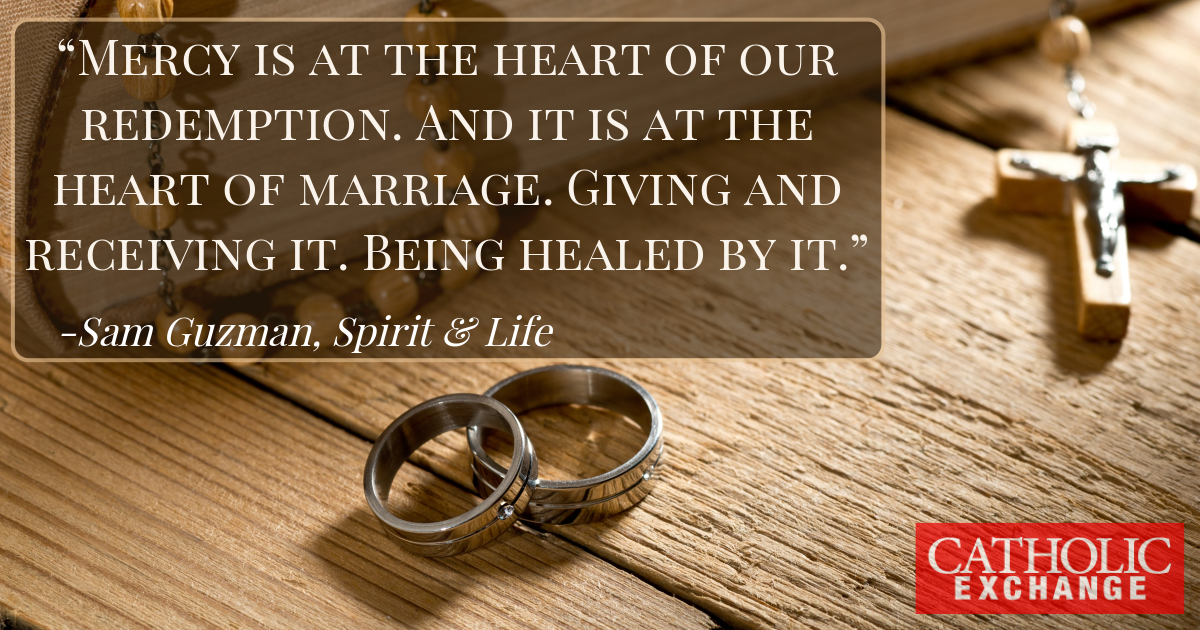The matrimonial covenant, by which a man and a woman establish between themselves a partnership of the whole of life, is by its nature ordered toward the good of the spouses. This clearly articulated by the Catechism of the Catholic Church:
“The matrimonial covenant, by which a man and a woman establish between themselves a partnership of the whole of life, is by its nature ordered toward the good of the spouses and the procreation and education of offspring; this covenant between baptized persons has been raised by Christ the Lord to the dignity of a sacrament.” (CCC, 1601)
Marriage, then, is no mystery but is well defined. And I might well continue to unpack this definition, exploring what marriage is and isn’t by citing Church Fathers, Church documents, philosophers, and theologians.
But this would be talking about marriage
from the outside, and it would be a mistake. I want to speak of marriage from
the inside. That is, I want to speak
from the heart, not about what marriage is,
but what marriage means. For marriage
is not merely a solemnly defined article in a catechism; it is not an
abstraction or an idea for academics to toy with. Like all sacraments, it is a
lived experienced, a concrete reality. And it is of this reality that I want to
speak.
When I was younger, and indeed more immature, I viewed marriage as the fulfillment of my longings. It was the answer, I believed, to my hunger for intimacy, to my desire for affirmation, and yes, even to my sexual urges. If only I could find a wife, I imagined, I would be content.
Eventually, I did find a beautiful woman whom I loved, and who, wonder of wonders, loved me in return. We quickly became engaged and began preparing for marriage. I eagerly pored over marriage books and articles and listened to countless talks about how to be a good husband.
In my naivete, I was quite convinced that I knew exactly what marriage was about, and I would no doubt be a wonderful and enviable husband. I understood marriage from the outside, and not from the inside.

But then I got married. No sooner had I done so than I came face-to-face with the ugliness of my own immaturity, my own selfishness, my own pride. It was jarring and unpleasant, to say the least. Wasn’t I better than this? Didn’t I know more about marriage than most young husbands? How can I hurt so often the woman I love? What is wrong with me?
These questions and more
plagued the early days of our marriage, for I felt like a complete failure as a
husband within a very short time. Despite my real love for my wife, I endlessly
chose my needs and desires over hers, and I could not understand why.
What I did not realize then, and do realize now, is that marriage is not about self-fulfillment. It is certainly not about satisfying sexual cravings or about mere emotional affirmation. It is a school of love. And as a school of love, it is a duel to the death with our disordered passions and lusts. It is a daily dying to our sinful selves. It is a moment-by-moment choosing of the way of the cross, which is the way of sacrifice.
Marriage, rightly lived, will indeed bring you more joy than you can possibly imagine. But you cannot find this joy by seeking it directly. This will only lead to disillusionment. “Whoever would save his life will lose it,” our Lord tells us, “and whoever loses his life for my sake will find it” (Matt. 16:25). Life can be found only through surrendering it. So too with the joy of marriage — it can be found only through self-forgetfulness and self-gift.
My wife and I have been married for eight years, and although I know it is almost a cliché to say it, I love her more now than I did when we got married. Through our years of marriage, I have learned much about authentic love and sacrifice (though I still have much to learn). And yet I have also realized that no matter how much I give to my wife, she has given me far more.
It is not enough to know
that God loves us in an abstract sense. We must experience His unconditional
love and mercy in a concrete way, and we most often do so through other people.
My experience of God’s love has come most profoundly through my wife.
I brought many
insecurities and self-doubts into our marriage. I feared fully revealing myself
to anyone, lest I be despised and rejected, and as a result, I had erected many
defenses to guard myself from emotional vulnerability. Some of these defenses
were harmless, while others led me to wound the woman I loved.
But despite my frequent foolishness, my insecurities began to heal one by one through my wife’s relentless love. Through her forgiveness and unconditional acceptance, I received a rare and precious gift — the gift of being fully loved as myself. My defenses began to drop; my heart began to heal. I learned the meaning of true intimacy and the joy that it can bring. And I am still learning it.
Marriage is a sacrament, a channel of
grace, a way to know and experience the love of God. St. Paul tells us that it
is a great mystery that illustrates the relationship between Christ and His
Church. Reflecting upon these truths, I see that there is one defining
attribute that characterizes this mystical marriage between the Lord and His
people more than any other: mercy.
Why did the Eternal Word,
the brightness of the Father, humble Himself, take on flesh, and descend into
Mary’s womb? To save us from our sins. Why did the Lord of all creation allow
Himself to be beaten, mocked, and nailed to a cross? To forgive us, to reconcile
us, to demonstrate His unfathomable love for us. “One will hardly die for a
righteous man,” St. Paul says in breathless astonishment. “But . . . while we
were yet sinners Christ died for us” (Rom. 5:7-8).
Mercy is at the heart of our redemption. And it is at the heart of marriage. Giving and receiving it. Being healed by it. I am firmly convinced that we come closest to the heart of marriage when we forgive — when we see each other exactly as we are, sins and all, and lay down our lives for one another anyway.
I began this article
speaking about sacrifice and self-gift. In our self-indulgent age, these are
dirty words. We associate them with pain, discomfort, even misery. Yet, for one
who has experienced mercy, sacrifice is no burden. It flows naturally from the
heart. It is the greatest joy.
In my marriage, I have indeed given much to my wife and children over the years. But nothing I have done can compare with what they have given me: a glimpse of the mercy and love of the Lord Jesus. Our marriages, our families, must become schools of genuine love and mercy. For if we love one another unconditionally, if we mercifully accept one another exactly as we are, we will experience a joy beyond description and a very real foretaste of heaven. Even more, our homes will become beacons radiating life and light to a world hungry for the love of God.
Above all, hold unfailing your love for one another, since love covers a multitude of sins. (1 Pet. 4:8)
✠
This article is a version of a reflection in the coffee table book, Spirit and Life: The Holy Sacraments of the Catholic Church. It is available from Sophia Institute Press.
















